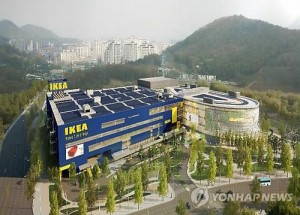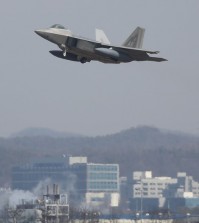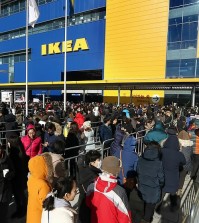- California Assembly OKs highest minimum wage in nation
- S. Korea unveils first graphic cigarette warnings
- US joins with South Korea, Japan in bid to deter North Korea
- LPGA golfer Chun In-gee finally back in action
- S. Korea won’t be top seed in final World Cup qualification round
- US men’s soccer misses 2nd straight Olympics
- US back on track in qualifying with 4-0 win over Guatemala
- High-intensity workout injuries spawn cottage industry
- CDC expands range of Zika mosquitoes into parts of Northeast
- Who knew? ‘The Walking Dead’ is helping families connect
IKEA to stop selling “Sea of Japan” map, admits inflated prices

A bird’s-eye view of IKEA Korea’s first South Korean store in Gwangmyeong, south of Seoul. It is scheduled to open on Dec. 18. (Yonhap)
By Lee Minji
SEOUL (Yonhap) — IKEA Korea said Thursday it will stop selling a disputed map that had marked the water between South Korea and Japan only as “Sea of Japan” starting next year as it prepares to open its first showroom in South Korea.
“We acknowledge that IKEA has made a mistake in underestimating the sensitivity of this issue and for this, we sincerely apologize… In accordance with our plans the PREMIAR wall decoration in question will be taken out in 2015 worldwide,” the local unit of Swedish furniture brand IKEA said in a press release.
“As a global company IKEA respects that the naming of countries, territories, borders and seas can be a sensitive topic and we do not take any point of view when it comes to these political topics,” the company added.
The Swedish furniture giant came under fire over the controversial map that spurred public fury over a long-disputed territory issue.
South Korea and Japan have locked horns over the name of the waters for decades, with Seoul calling it the “East Sea” while Tokyo uses the name “Sea of Japan.”
In a news conference last month, IKEA Korea’s retail manager Andre Schmidtgall apologized for the issue but said the company will not recall products that have already been sold.
The latest announcement comes two weeks ahead of the Dec. 18 opening of its first South Korean showroom in Gwangmyeong on the outskirts of Seoul. It will be the biggest IKEA store in the world.
In addition to the map controversy, the Swedish furniture brand has undergone a rocky market debut as angry consumers raised complaints about unfair pricing policies.
They claimed that the price of some popular IKEA products were fixed at a higher cost in South Korea compared with other markets such as the United States.
The company has said it has no plan to change the price tags, claiming it has set appropriate prices after considering a number of factors such as exchange rates and import tariffs.












![일본 사도광산 [서경덕 교수 제공. 재판매 및 DB 금지]](http://www.koreatimesus.com/wp-content/uploads/2024/07/PYH2024072610800050400_P4-copy-120x134.jpg)


